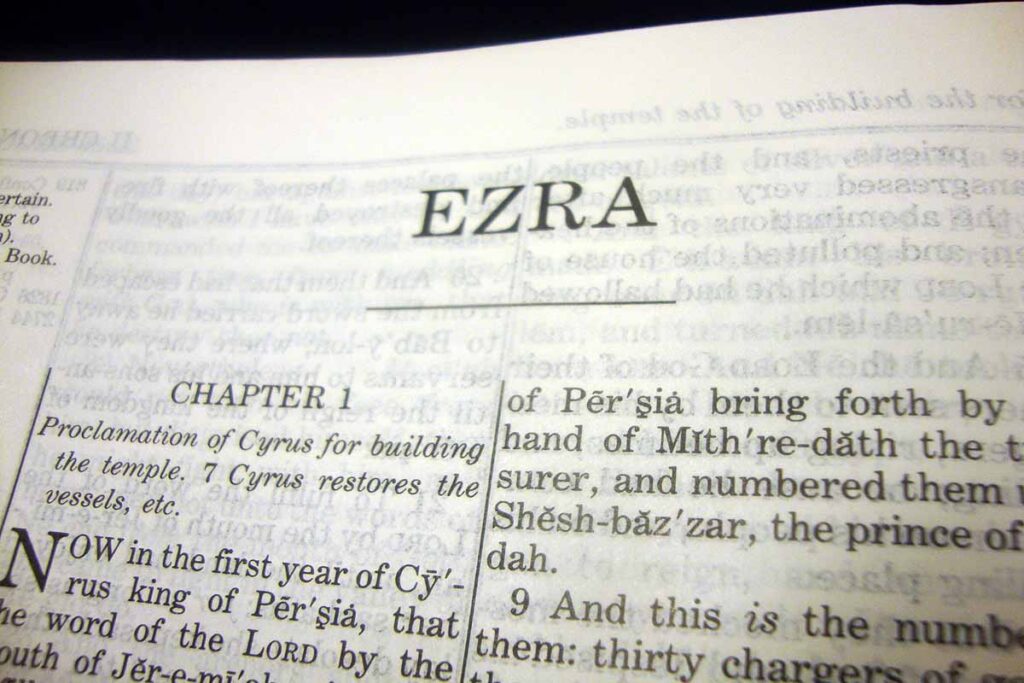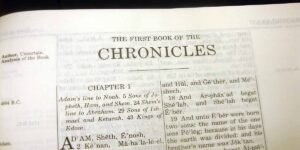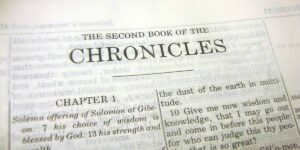The book of Ezra
Ezra was a priest, a scribe, and a great leader. His name means “help,” and his whole life was dedicated to serving God and God’s people. Tradition says that Ezra wrote most of First Chronicles and Second Chronicles, Ezra, Nehemiah, and Psalm 119 and that he led the council of 120 men who formed the Old Testament canon. He centers the narrative of the book around God and His promise that the Jews would return to their land, as promised by Jeremiah. This message formed the core of his life, the last half of the book gives a very personal glimpse of his life. His knowledge of scripture and his God-given wisdom was so obvious to the king that he appointed Ezra to lead the second emigration to Jerusalem, to teach the people God’s word, and to administer national life.
Finally given the chance to return to their homeland, the people started to rebuild the temple, only to be stopped by opposition from their enemies. God’s work in the world is not without opposition. We must not get discouraged and quit, as the returning people did at first, but continue on boldly in the face of difficulties, as they did later with the encouragement from the prophets.
Ezra returned to Jerusalem almost 80 years after Zerubbabel, only to discover that the people had married pagan or foreign spouses. This polluted the religious purity of the people and endangered the future of the nation. Believers today must be careful not to threaten their walk with God by taking on the practices of unbelievers.
Writer of Ezra
The book of Ezra, whose name likely means “The Lord Has Helped,” derives its title from the chief character of chapters 7-10. We cannot be totally sure whether Ezra himself compiled the book or it was compiled by an unknown editor. The generally accepted conservative view is that Ezra compiled or wrote this book, along with First Chronicles, Second Chronicles and Nehemiah. The Hebrew Bible recognized Ezra-Nehemiah as a single book.
Date Written
Around 450 B.C., recording events from about 538 – 450 B.C. (omitting 516-458 B.C.); possibly begun earlier in Babylon and finished in Jerusalem.
Purpose of Ezra
To show God’s faithfulness and the way he kept his promise to restore his people to their land. The messages of Ezra are a constant reminder of how easily God’s people can lose heart and their distinctiveness. God is fulfilling His promises. In spite of this, covenant people easily forget His promises and the moral distinctions that are to characterize “a royal priesthood, a holy nation, His own special people” (1 Peter 2:9).
Historical Setting
The book of Ezra belongs in the post-exilic period. These were the years just after a remnant of the nation returned to Jerusalem following their exile of about 50 years in Babylon. The return came about after the defeat of Babylon by the Persian Empire. Unlike the Babylonians, the Persians allowed their subject nations to live in their own native regions under the authority of a ruling governor and practiced religious tolerance.
Theological Contribution
The theme of the book of Ezra is the restoration of the remnant of God’s covenant people in Jerusalem in obedience to His law. In His providence, God used even the unrighteous Persian kings to work His ultimate will and return His people to their homeland.
Special Consideration
Ezra’s treatment of the pagan women whom the Jewish men had married poses a problem to some readers. How could he be so cruel as to insist that these wives be “put away” (divorced) with no means of support? His actions must be understood in light of the drastic situation that faced the Jewish community in Jerusalem following the exile. Only a small remnant of the covenant people had returned, and it was important for them to keep themselves from pagan idolatry and foreign cultural influences at all costs. Ezra must have realized, too, that this was one of the problems which had led to their downfall and captivity as a people in the first place.
Recommended Bible Study Resources
ESV Study Bible – Study Bibles give you a deeper understanding of God’s Word with tools for life application like commentary, maps, charts, concordance, and study notes. Search our popular translations- NIV, ESV, NKJV, KJV and more!
Believer’s Bible Commentary: Second Edition – A Bible commentary is a written, systematic series of explanations and interpretations of Scripture. Commentaries often analyze or expound on individual books of the Bible, chapter by chapter and verse by verse. Some commentary works provide analysis of the whole of Scripture.
The New Strong’s Expanded Exhaustive Concordance of the Bible – The best concordance for word study! This exclusive new edition of a legendary classic puts generations of biblical research at your fingertips. A valuable tool for pastors, teachers, and students of the Bible.
Vine’s Complete Expository Dictionary of Old and New Testament Words – This classic word study resource allows you to study the meaning of biblical words in the original languages without spending years learning Greek or Hebrew. A great resource for students, seasoned pastors, and anyone who enjoys biblical word studies–even if they have little to no formal training in Hebrew or Greek.
Halley’s Bible Handbook – The beloved and classic Bible companion has been thoroughly updated, while retaining its time-honored features and Dr. Halley’s highly personal style, to offer even greater clarity, insight, and usefulness.
Click here to download or print the Bible outline “Ezra – Priest, Scribe, Leader“.





